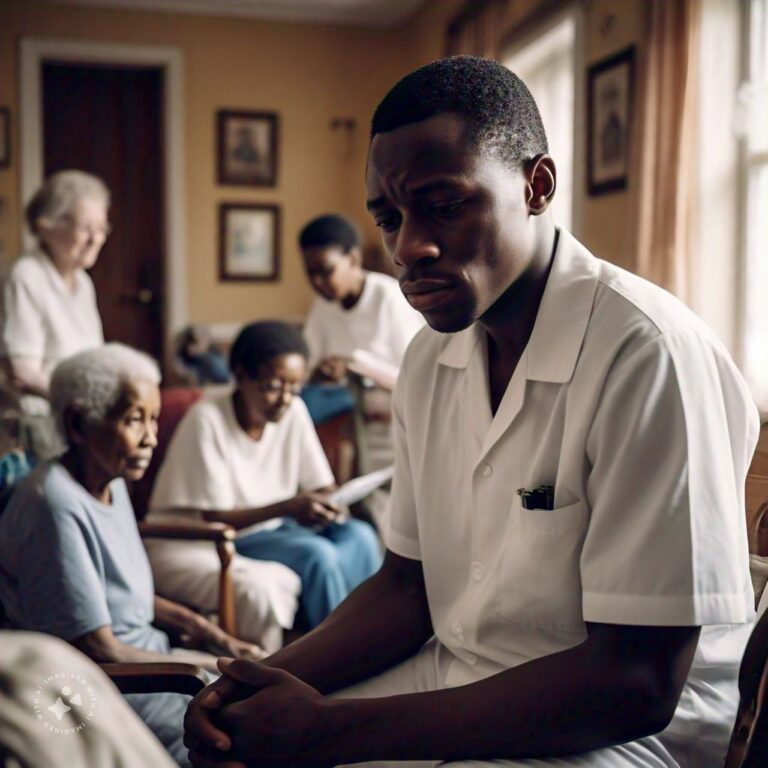
The house was quiet, too quiet. Mama Tayo sat by the window, staring out at the empty street. Her hands, now wrinkled and spotted, rested in her lap, and her heart felt as heavy as the silence around her. Most of her family had moved abroad. Her children called often, sending pictures of their lives in distant countries, but the house still felt painfully empty. She missed the laughter that once filled these walls, the sound of little feet running across the floor, and the voices of her loved ones.
In the stillness, she closed her eyes and drifted back to her youth. She could see herself, young and full of life, dancing at her wedding, surrounded by friends and family. Back then, everything felt possible, and the world was wide open. Now, the days stretched long, and her body ached with age.
A tear slid down her cheek, but she didn’t wipe it away this time. She wondered how long she would live like this—waiting, hoping for visitors that rarely came. She loved her children, but they had their own lives now. The distance between them was more than just miles; it was time, change, and the years that had passed without them noticing how much she had aged.
Mama Tayo sighed deeply and leaned back in her chair, feeling the weight of loneliness press down on her chest. The memories, though beautiful, only seemed to remind her of how far she was from those happy days. She opened her eyes and stared at the empty street, knowing that, much like her heart, the house would stay silent for a long time.
We often focus on the physical health of our elderly, which is important. But sadly, we tend to overlook the mental health of the older generation. In Nigeria, there’s very little support for mental healthcare, especially for seniors. Mental illness is often misunderstood, leading to stigma, and many older adults facing mental health challenges are seen as burdens.
This needs to change. The first step toward a better understanding is recognising how delicate a senior’s mental state can be and learning about the common mental health issues they may face.
- Depression
Depression is common among older people. As people age, mental health challenges become more common. Like Mama Tayo, our elders can experience sadness and loneliness. The house feels empty, and the occasional visits or phone calls may not be enough. Unfortunately, in Nigeria, depression is often overlooked. Seniors struggling with depression might feel constantly tired, restless, or empty and may have trouble sleeping.
- Bipolar Disorder
Bipolar disorder causes extreme mood swings, with highs (mania) and lows (depression). While it’s usually diagnosed earlier in life, it can get worse as someone ages, even with treatment. In some cases, it might be mistaken for dementia because seniors with bipolar disorder can experience confusion, memory loss, and poor judgment.
- Dementia
Dementia is when a person loses their memory and ability to think clearly. It’s common among older people, with Alzheimer’s being one of the most well-known types. Alzheimer’s gradually destroys seniors’ memory and thinking skills, eventually making it impossible for them to care for themselves. People with Alzheimer’s need ongoing care and support.
- Anxiety
Anxiety is a by-product of constant worry and fear. It sometimes works hand in hand with depression and is present in a significant amount of seniors. The World Health Organization reports that over 3.8% of older adults suffer from anxiety disorders. This can show up as social anxiety, obsessive-compulsive disorder, or general fearfulness. Seniors may experience dizziness, digestive issues, or muscle tension when dealing with anxiety.
- Schizophrenia
Schizophrenia is a severe mental illness that distorts a person’s reality. In seniors, it can look similar to dementia, with symptoms like confusion, paranoia, hallucinations, and withdrawal from social interactions.
Why Mental Health Awareness Matters for Seniors
Many older adults in Nigeria are struggling with mental health issues, and the ongoing economic challenges only serve to make it worse. Even though mental health is being taken more seriously nowadays, it’s still not enough. We need to raise more awareness about the mental illnesses affecting our seniors so we can help them better.
By understanding the mental health problems that seniors face, we can spot early warning signs and get them treated sooner. This way, we can give our parents, grandparents, and loved ones the peaceful, happy, healthy life they deserve. And when we grow old, these same systems will support us, too.
How to Care For A Senior With Mental Illness
- Be Patient and Understanding: Mental illness can change how seniors behave or handle everyday tasks. Show them patience and empathy to help them feel supported.
- Create a Calm and Safe Space: Make their home comfortable, clutter-free, and peaceful to reduce stress and anxiety.
- Encourage Social Connections: Loneliness can make mental health worse. Help your loved one stay connected with family, friends, or social activities. Even a simple chat can lift their spirits. Regularly encourage them to openly express themselves and their feelings.
- Promote Physical Activity: Gentle exercises like walking or stretching can improve mental and physical health, reduce stress, and improve mood.
- Ensure Medications Are Taken: If they are on medication, help them stick to the prescribed schedule. Reminders or medication planners can help with this.
- Keep Their Mind Active: Encourage activities and hobbies such as solving puzzles, reading, knitting and light gardening. Mental stimulation can help slow down cognitive decline.
- Listen to Their Concerns: Sometimes, being there to listen can make a big difference. Regularly encourage them to openly express themselves and their feelings, fears, worries, wishes or desires.
- Watch for Signs of Depression or Anxiety: Changes in mood, appetite, or sleep patterns might signal worsening mental health. If you notice these, be more alert and seek professional help.
- Don’t Be Afraid to Seek Professional Help: There’s no shame in dealing with mental health challenges, despite what some people may think. Getting professional help is important for your senior’s well-being as the professional will be able to make recommendations and offer solutions.
- Consider Engaging a Trustworthy and Compassionate Caregiver: Having a trustworthy caregiver can make things easier for everyone. They are often better trained to support seniors with mental health challenges.
At @Ìtọ́jú, we understand the importance of mental health for seniors. Our trained caregivers and doctors are dedicated to keeping your loved one in the best mental state, providing them with a safe and caring environment. Contact us today for more information about our services and how to care for your seniors.



